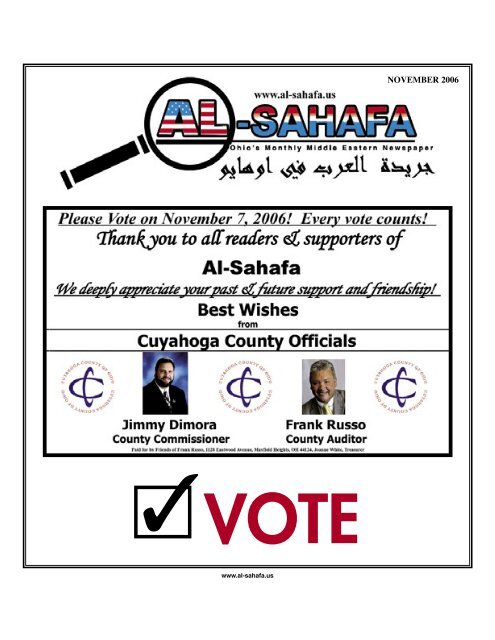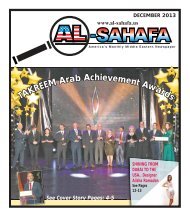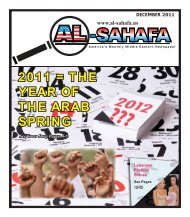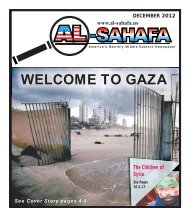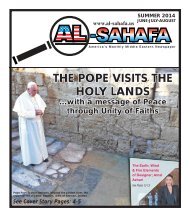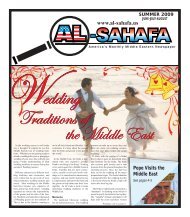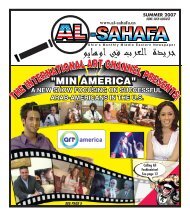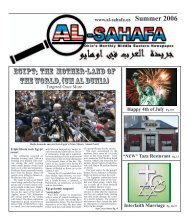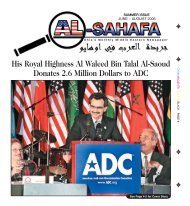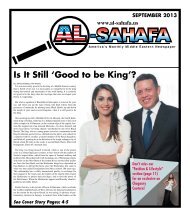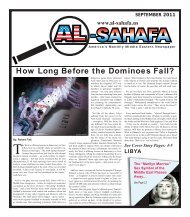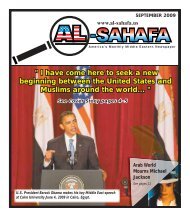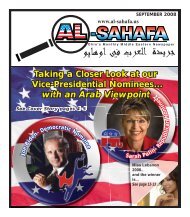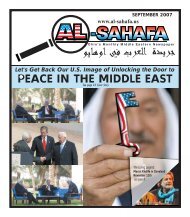AlsahafaNewspaperNovember2006
Create successful ePaper yourself
Turn your PDF publications into a flip-book with our unique Google optimized e-Paper software.
NOVEMBER 2006
The time is right for change<br />
The topic I’d like to discuss with you all this<br />
month is about “Reformulating Policy in the<br />
Middle East,” an issue that is critical to get right.<br />
We need to get our Middle East policy right. If we<br />
don’t get it right, it’s become clear that we can’t<br />
have security in the United States. So it’s important<br />
for U.S. citizens to get it right.<br />
Our allies need us to get it right because they<br />
can’t have security, and the people of the region<br />
need us to get it right because the destruction that<br />
we saw in Lebanon, the destruction that we’re seeing<br />
in Iraq, we don’t want to see that continue to<br />
expand to other countries in the region.<br />
So, this is a critical moment to really look at this<br />
issue of reformulating policy in the Middle East.<br />
It’s important that we begin to have a very honest<br />
and frank discussion about it.<br />
So how do we make a more sensible Middle<br />
East policy? I think when you start to look at the<br />
Middle East you have to start with the obvious - the<br />
question of oil. There’s no question that controlling<br />
the oil and the profits from oil is a top priority in<br />
EDITOR’S THOUGHTS<br />
the Middle East, particularly as we are competing<br />
with China and India for that resource. As it gets<br />
more precious and more expensive, that becomes a<br />
higher priority. So if you want to talk about reformulating<br />
policy in the Middle East, it starts with<br />
reformulating our energy policy at home and by<br />
becoming a leader in the world for a more sensible<br />
energy policy.<br />
We have the technology to change our energy<br />
policy away from the dirty, nineteenth-twentieth<br />
century fossil fuel economy toward a twenty-first<br />
century clean, sustainable energy economy. A<br />
review of the wind resources, for example, in the<br />
United States by the federal government found that<br />
three states alone could provide enough energy<br />
through wind to satisfy all of our electricity needs.<br />
Three states alone. One of those is Texas.<br />
Even oil-rich Texas can profit and continue to<br />
profit from the wind resources. And that’s just one<br />
source. What’s great about the moment that we’re<br />
in right now is that we’re reaching a tipping point<br />
where the public is ready for this. The public is<br />
ready for this transition. They know it’s needed. It’s<br />
needed for a variety of reasons. There’ll always be<br />
a need for some oil. So, the Middle East will still<br />
be an issue, but it won’t become a national security<br />
issue if we can break our addiction to oil. It’s also<br />
an environmental urgency.<br />
So we have a combination of economic and<br />
<br />
<br />
environment and national security coming together<br />
with the same conclusion. It’s time to break our<br />
addiction to fossil fuels. It’s urgent. There’s no<br />
time to waste on it. The missed opportunity of 9/11<br />
for our oil-based economy was to say, “We need<br />
to get all these old, dirty fossil fuel cars off the<br />
streets within ten years. We could do it.” Imagine<br />
the Midwest (OHIO) with the explosion in new<br />
automobile sales and new automobile production.<br />
The Midwest would have been growing. We’d also<br />
change the way our buildings operate, both personal,<br />
commercial and government buildings, because<br />
there’s a lot of waste there as well. The United<br />
States wastes half the energy that it has, and so we<br />
can have a lot of room in there for that change. I<br />
think once we break our oil addiction, which I think<br />
is very doable and essential, then we can really look<br />
at the Middle East in a much more sensible way.<br />
So I hope that people hearing this will run for<br />
office themselves, because we really need leadership.<br />
We need people to get up and say that we<br />
need to change direction because that is the role of<br />
us as civic players and we need to start to be civic<br />
participants in the government. As civic participants<br />
we need to not just run for office, we need to be<br />
advocating these issues because I think the time<br />
is right for change. I repeat, the time is right for<br />
change.<br />
You can see it in the polling. You can see it in the<br />
votes we’ve had<br />
around the country.<br />
Currently, so<br />
far, this election<br />
season, people<br />
are ready to see<br />
a different direction<br />
in government,<br />
and once<br />
we get a different<br />
direction<br />
in government<br />
with an emphasis<br />
on breaking<br />
away from a<br />
fossil fuel-based<br />
economy which<br />
I think is the<br />
key for so many<br />
war and peace issues, like the Middle East; and the<br />
issue of our economic environment. And once we<br />
get these key issues right, I believe things will start<br />
to fall in place.<br />
Oh...and by the way, Happy Thanksgiving on<br />
November 23rd! ...Gobble Gobble :))<br />
Fatina Salaheddine<br />
(Lebanese-American)<br />
Please acknowledge: All information in this publication<br />
tion,<br />
Reproduction, Printing or Copying of the logo, text, or<br />
featured design trademarks is permissible. Al-Sahafa Inc.<br />
will commence legal action in the event, including attorney<br />
fees and costs to the prosecuted.<br />
<br />
11535 Lorain Ave. Suite # 1<br />
Cleveland, OH 44111<br />
Phone: (216) 688-0991<br />
Fax: (216) 688-0993<br />
<br />
Tiffany Kehoe<br />
<br />
S. Sharp<br />
Fashion & Style<br />
Alissar Roueiheb<br />
<br />
Saman Muraeshi<br />
Restaurant Reviewer<br />
Mark Hopkins<br />
www.al-sahafa.us<br />
<br />
<br />
<br />
month. (Exceptions to this is during the time this of-<br />
<br />
• Distribution takes two days subsequent to printing<br />
in order to reach the familiar racks/ businesses and<br />
postal mailings, due to Al-Sahafa’s Statewide outreach.<br />
• Deadlines for Advertisements and Articles to be<br />
published in the following monthly issue, fall on the<br />
third Friday of each month. (For Ad Rates or for more<br />
<br />
Monday through Friday, 9 a.m.- 5 p.m.).<br />
• Can’t Get Enough of Middle Eastern Events? Call<br />
our “Events Line” (216) 688-0991 and press the #2.<br />
For just $5 a day (minimum of one week), you too<br />
can maximize exposure, by placing your upcoming<br />
Event on this line.<br />
<br />
more out of your free time, and join our PR family of<br />
great fun and rewarding activities- all in the name of<br />
<br />
<br />
<br />
our Online World:<br />
• Voice your opinion and comments on our<br />
“Reader’s Forum”!<br />
• E-mail and interact with Al-Sahafa!<br />
• Get updates from your Middle Eastern Embassy!<br />
• Discover Al-Sahafa’s 5 year “Scrap Book” in<br />
making news!Mission StatementThe name Al-Sahafa<br />
means ‘the media’ or the ‘reporter’ in Arabic.<br />
<br />
The purpose of Al-Sahafa Newspaper is to provide a bridge of com-<br />
<br />
Northeast Ohio. Al-Sahafa is open to all persons in any creed, race,<br />
religion, or organization. This publication does not and will not tolerate<br />
any form of Religious Contempt of Discrimination of country origin in<br />
the Middle East. We are all God’s children. This publication is understandably<br />
controversial at times, but its contents sole purpose is to spark<br />
readers’ interest and attention about the “Arab” view point on all past<br />
and current political, cultural and social issues effecting our daily lives.<br />
“I love you when you bow in your mosque, kneel in your temple,<br />
pray in you church. For you and I are sons of one religion and it is<br />
in the spirit.”<br />
-Khalil Gibran (Arab American poet)
James Zogby<br />
(President; Arab American Institute,<br />
Washington D.C.)<br />
In not a single House or Senate race<br />
being contested this year will the candidates<br />
engage in a serious debate about the failed<br />
U.S. policy in the Middle East. There are<br />
a number of races where the Iraq war is an<br />
issue, but in these instances the debate has<br />
more to do with how we got into th<br />
e war, the mistakes we’ve made and how<br />
we should leave. There are, to be sure, supporters<br />
of the president’s vision (or fantasy)<br />
of the Iraq War, i.e. that we are producing a<br />
democracy that will transform the region.<br />
But in no case is there a serious discussion<br />
about Iraq itself or the consequences of<br />
our broader Middle East policy.<br />
How can this be, especially given the<br />
reality of the horrible impact our polices<br />
have yielded for the people of the region in<br />
just the past few years?<br />
We have created a mess. Iraq is a cauldron<br />
of explosive violence, with most of<br />
that country’s neighbors living in fear of its<br />
implosion. Iran, now emboldened by our<br />
failure in Iraq, has coupled inflammatory<br />
extremist r<br />
hetoric with a defiant nuclear challenge.<br />
Middle East News<br />
Deadly Silence On The Middle East<br />
Lebanon, still reeling after this summer’s<br />
devastating assault, is deeply divided with<br />
civil conflict looming on the horizon. The<br />
Palestinians have suffered from U.S. neglect<br />
of the peace process and the continued<br />
brutality of the occupation, both of which<br />
have contributed to a growth of extremism<br />
and the internal dissolution of their society.<br />
Meanwhile, Israel, the supposed ally, has<br />
fared no better, with war and occupation<br />
resulting in renewed isolation and insecurity.<br />
All of this points to a remarkable story of<br />
failure, and yet not a single campaign has<br />
challenged the polices that have brought<br />
us to this point.Instead of debate, there is<br />
silence-as if the horrors of this past summer<br />
in Lebanon, Palestine and Iraq didn’t happen,<br />
and our policies in no way contributed<br />
to the mess both we and the peoples of the<br />
Middle East are in.<br />
There is, it appears, a bipartisan consensus<br />
in support of failure, with a resulting<br />
deadly silence.There are two areas where<br />
the Middle East is being discussed. Some in<br />
both parties continue to demonstrate resolve<br />
to “end our dependency on Middle East<br />
oil.”<br />
This slogan has been crafted to falsely<br />
conflate several problems-terrorism, environmental<br />
concerns and anti-Arab sentiment.<br />
This campaign is profoundly misleading<br />
on so may levels (e.g .: we are dependent<br />
on oil, but not Middle East oil per se;<br />
environmental concerns are real and should<br />
be addressed, but Arab-baiting isn’t helpful<br />
in this regard; and generalizing Arab wealth<br />
and conflating it with “terror” is as racist as<br />
the old “Jewish banker” canard).<br />
The other instance where the Middle East<br />
emerges as an issue in some campaigns is<br />
with the crowd that just can’t seem to let go<br />
of the DPW ports issue. Some Democratic<br />
campaigns are still seeking to “exploit”<br />
their “victory” on this issue-some in campaign<br />
materials and others in boasting<br />
phone calls to voters. Shameful.<br />
The Middle East poses too many critical<br />
challenges and it holds too many vital interests<br />
for this region to be treated so shabbily.<br />
As I have noted before: in the past three<br />
decades, since the end of Vietnam, the U.S.<br />
has spent more foreign aid, shipped more<br />
weapons, sent more troops, fought more<br />
wars and lost more lives (even before Iraq)<br />
in the Middle East, than anywhere else in<br />
the world.<br />
We’ve also expended more political capital<br />
in one-sided diplomacy that refused to<br />
understand regional realities or recognize<br />
our broader interests, and we’ve created<br />
enormous animosity because of these failures.<br />
And yet, no debate.I am often told that<br />
the reason is fear of offending powerful<br />
special interests (the “religious right” and<br />
hard-line pro-Israel Jewish groups). But<br />
polling shows that while many Americans<br />
do indeed support Israel, they want the<br />
administration to pursue policies that are<br />
balanced and support a just peace settlement<br />
(this is also true of polling within the Jewish<br />
community).<br />
Most Americans know that they do not<br />
understand the Middle East, see our polices<br />
as one-sided and failed, and want change.<br />
But, it appears they won’t get any change<br />
this year.It’s too late to expect any meaningful<br />
debate to occur in 2006-but not too late<br />
to demand that is on the agenda for 2008.<br />
We simply cannot continue to alienate<br />
ourselves from the peoples of this critically<br />
important part of the world. We simply cannot<br />
persist in operating so blindly in a region<br />
whose peoples, culture and history we do not<br />
understand. We simply cannot allow those<br />
who seek to lead us to continue to refuse to<br />
confront our failures and to be silent.<br />
We should have debated our Middle East<br />
policies years ago. We did not. It is vitally<br />
important that the debate begin now.<br />
People get the government they deserve<br />
By Joanne McKenna<br />
86 percent of voting-age Arab<br />
Americans were registered voters in early<br />
2000.<br />
We are good citizens and exercise our<br />
right to vote for the candidates of our<br />
choice.Our country has invaded and occupied<br />
Iraq. Lebanon has been decimated<br />
and Palestine continues to be brutalized,<br />
starved and robbed - all with U.S. acquiescence.<br />
Syria is being threatened. The image of<br />
the United States in the Middle East has<br />
never been more malignant.<br />
The civil liberties of Arab Americans are<br />
being abridged and ethnic and religious<br />
discrimination is rife in the U.S.<br />
There is no open discussion and debate<br />
about U.S. policies toward the Middle<br />
East. Legislators and candidates for political<br />
office may express opinions about our<br />
involvement in Iraq but it is the rare legislator<br />
- Republican or Democrat - who<br />
voted against giving this Administration<br />
the power to invade and occupy Iraq.<br />
Rarer still is the politician or political<br />
candidate who is willing to address or<br />
debate the cause and effect of unqualified<br />
military, moral, financial and political<br />
support of Israel no matter what it does<br />
or how it negatively impacts the vital and<br />
legitimate interests of the United States in<br />
the Middle East.<br />
The United States was founded on the<br />
rule of law.<br />
The liberties that Americans enjoy and<br />
cherish are based on the law being applied<br />
equitably and justly to all.<br />
When the law is not applied equitably<br />
and justly to all U.S. citizens and when<br />
international laws are set aside or brazenly<br />
violated, we are diminished and our freedom<br />
as a nation and as a people is imperiled.<br />
Do we remember those noble words in<br />
our Declaration of Independence? “We<br />
hold these truths to be self-evident, that<br />
all men are created equal, that they are<br />
endowed by their Creator with certain<br />
unalienable rights, that among these are<br />
life, liberty and the pursuit of happiness.<br />
That to secure these rights, governments<br />
are instituted among men, deriving their<br />
just powers from the consent of the governed.”<br />
To what, exactly, have we given our<br />
consent with regard to U.S. policy toward<br />
the Middle East?For Election 2006 we<br />
are faced, in most cases, with a limited<br />
choice of candidates and Arab Americans<br />
will probably hold our noses and vote for<br />
whatever glimmer of change we can find.<br />
We must get ourselves together, voice our<br />
concerns and demand of our legislators<br />
an open discussion on U.S. policy toward<br />
the Middle East. We must insist that our<br />
viewpoints be heard and considered.<br />
We must communicate to our legislators<br />
by letter, e-mail, telephone, fax, and in<br />
personal visits our dissatisfaction with the<br />
status quo of U.S. foreign policy toward<br />
the Middle East.Our beloved United States<br />
of America is sliding into an abyss.<br />
We, who know more about the Arab<br />
World than do 99% of Americans, must<br />
insist - and even demand - that our legislators<br />
begin a candid, open and frank debate<br />
on U.S. policy toward the Middle East.If<br />
we don’t do it, who will?
Wednesday December 6th.<br />
The meeting begins at 7:30pm at the Holiday Inn-Rockside.<br />
Free to Members. $10 for non-members or non-members may pay their 2007 dues and<br />
enter free. For more information, contact President,<br />
Abdullah Mina at 216-749-6629<br />
<br />
<br />
<br />
A two-day Conference of Palestinian American community leaders and activists from 17 states<br />
will take place in Cleveland, Ohio on November 10-12, 2006. The meeting, which will be held at the<br />
ACCESS-OHIO Hall, will usher the process of organizing a Palestinian-American popular conference<br />
open to all Palestinians throughout the United States, either in 2007 or 2008, (to be decided<br />
at the 2-day Conference). Coincidentally, the 2-day meeting falls on the 60 year anniversary of<br />
Al Nakba. The conference will focus on sustaining the Palestinian narrative and culture amongst<br />
<br />
Palestinian rights. Space at the organizing meeting is limited. Members of the Cleveland Palestinian<br />
community interested in attending the meeting, need to register by contacting the Palestine Office in<br />
Detroit, Michigan at 313-945-9660, or Mr. Abbas Hamideh (216-299-6002), or by emailing palestine<br />
conferenceusa@yahoo.com.<br />
COMMUNITY<br />
<br />
<br />
My name is Saman Quraeshi, and I<br />
want to introduce myself to the community<br />
as the new Marketing Manager for Al-<br />
Sahafa. I’m originally from sunny Florida,<br />
and let me just say; the cold weather is<br />
already making me nervous! I recently<br />
got married and that is why I am here in<br />
Ohio (love really does make you do crazy<br />
things).<br />
I am a Pakistani-American and this past<br />
year I lived in Karachi. In Karachi, I experienced<br />
many things that surprised me and<br />
made me realize just how small the world<br />
really is.<br />
I noticed that American Brand Names<br />
such as Abercrombie, Coach, and Nike are<br />
huge with the youth. Many times I would<br />
hear the music of well-known American<br />
artists such as Eminem, Beyonce, and<br />
Sean Paul at parties and pumping loudly<br />
in cars.<br />
The variety of American foods readily<br />
available was quite a treat for me too! We<br />
enjoyed McDonald’s, KFC, Papa Johns,<br />
Pizza Hut, Subway and a TGI Friday. The<br />
burgers at McDonalds and other fast food<br />
chains also came with the option of being<br />
spicy, thus incorporating the local tastes<br />
of native Pakistanis while at the same<br />
time bringing American food to a country<br />
which is half-way across the world!<br />
What brought me to Al-Sahafa, you ask?<br />
Well, by being American it is something<br />
that we should all be proud of and at the<br />
<br />
<br />
same time, should celebrate our distinctive<br />
cultures and heritage, and Al-Sahafa does<br />
just that! Being that Al-Sahafa represents<br />
Ohio’s large Middle Eastern population,<br />
there are many issues and topics that we<br />
have to stay on top of. And although, I<br />
just joined the team, I can see that many<br />
loyal Al-Sahafa fans have been instrumental<br />
in keeping this vital publication going<br />
strong.<br />
I hope that as the Marketing Manager, I<br />
can serve as a liaison between the varied<br />
businesses with Al-Sahafa. My goal is to<br />
get advertisements that are relevant and<br />
would serve purpose to our readership<br />
base, while at the same time benefit businesses<br />
around the community.<br />
Hope to work with you soon!
Each month, different “Feature<br />
Profiles” will be included, to show<br />
our readers how diverse, and yet<br />
just how similar we all really are.<br />
Please keep in mind, that this<br />
Newspaper has gotten great reviews<br />
because of its extensive marketing<br />
and exposure not only in the<br />
great state of Ohio, but also in<br />
Washington D.C., California,<br />
Michigan, New Jersey, New York,<br />
Pennsylvania, and Texas. (This<br />
is just to name a few states in<br />
America - we have also been<br />
exposed internationally). Basically<br />
- what you need to keep in mind is<br />
that a lot of people are reading this<br />
Newspaper!<br />
The religion(s), customs, countries,<br />
and people of Middle East<br />
have been such a target for negative<br />
media and publicity in the<br />
past 4 years. This “Feature<br />
Profile” section has high hopes of<br />
“Breaking Down Barriers”, and<br />
reminding our readers exactly how<br />
beautifully rich and vastly cultured<br />
our land of Arabia is, and where we<br />
all stem from.<br />
GETTING TO KNOW:<br />
Mr. Walid Jammal<br />
* Born in Beirut, Lebanon<br />
* Have an American Family<br />
Insurance Agency at 4858 Dover<br />
Center in North Olmsted.<br />
* Although, I do not belong to<br />
any specific organization, I volunteer<br />
for many different causes, the<br />
American Cancer Society, Muscular<br />
Dystrophy Association, member<br />
of the St. George Church Parish<br />
Council Board.<br />
* I have been in the states for 24<br />
years (that is all my adult life)<br />
* Speak, write and read Arabic<br />
and French<br />
* My immediate family all live in<br />
the states, uncles, aunts and cousins<br />
as well as my wife’s family all live<br />
between Lebanon, Syria, Kuwait,<br />
United Arab Emirates, and Europe.<br />
* I try to go back as often as I<br />
can.<br />
* It has been 5 years since I have<br />
been back to Lebanon. On that trip<br />
I visited many places in the country<br />
and traveled to Cyprus, Italy,<br />
France and back to Beirut. As a<br />
matter of fact I was in Paris on<br />
September 11<br />
* Roman Orthodox is my religion<br />
* We are<br />
big on celebrations,<br />
any<br />
reason to get<br />
together is a<br />
good enough<br />
reason to<br />
bring family<br />
and friends<br />
together<br />
- we celebrate<br />
with<br />
all religions,<br />
with friends<br />
and families<br />
in different<br />
faiths by<br />
marriage,<br />
how can you<br />
not be a part<br />
of each others<br />
lives?<br />
* I attend<br />
Mass at several<br />
Arab<br />
American Churches; St. George on<br />
W. 14th, St. Elias on Memphis and<br />
St. Maron on Carnegie.<br />
* I have spent about 20 years in a<br />
corporate environment and was able<br />
to attain executive positions. Yet<br />
throughout, I had to educate people<br />
about the Middle East, the different<br />
culture and customs and introduce<br />
them to our world, as their<br />
views were always tainted with<br />
perceptions and portrayals of Arabs<br />
through the media.<br />
* You can not ignore what happened<br />
to our culture after 9/11.<br />
Persons whom I met after 9/11, had<br />
certain prejudices and I had to overcome<br />
them again thru education and<br />
proving to them that stereotyping a<br />
group of people because of one act<br />
is wrong. Reminding them of what<br />
happened in Oklahoma City a few<br />
years earlier usually opened their<br />
eyes, and gave them the opportunity<br />
to stop and reflect. Normally it<br />
made them change their views of us<br />
as Arab Americans.<br />
* The war on Iraq did not have<br />
any major impact on me. I usually<br />
keep politics and political views<br />
out of my day to day dealings and<br />
my professional life. I hold my<br />
views and beliefs to myself, what is<br />
important to me is treating people<br />
with the respect and decency and I<br />
expect them to reciprocate, regardless<br />
of their ethnicity, religious,<br />
COMMUNITY<br />
Getting to know Mr. Walid Jammal<br />
<br />
or political<br />
beliefs. I<br />
refuse to deal<br />
with anybody<br />
who does not<br />
have values,<br />
morals or does<br />
not fear God<br />
or a higher<br />
being.<br />
* I am Arab-<br />
American,<br />
and I always<br />
remind my<br />
American<br />
Friends that<br />
I am an<br />
American by<br />
Choice.<br />
* It is my<br />
experience<br />
that educational<br />
levels in<br />
Lebanon are<br />
much more<br />
advanced than here. When I first<br />
came to go to college, I was able to<br />
transfer many credits, and later on<br />
when my nieces moved to the states<br />
one was accepted as a sophomore<br />
at Kent State although she had not<br />
started college back home and her<br />
sister was accepted as a senior in<br />
High School and back home she<br />
was about to start HS.<br />
* Before 9/11 any time I traveled<br />
on business, I was singled out to be<br />
searched or to have my briefcase<br />
checked for traces of explosive for<br />
the way I looked, at one point I<br />
even shaved my moustache thinking<br />
it might help. After 9/11, the security<br />
measures are across the board,<br />
yet we can be singled out to be<br />
strip searched at the airport.<br />
* My hope is that we will have in<br />
our lifetime a lasting peace over the<br />
entire Middle East, where everyone<br />
can live together in harmony and<br />
respect. Why cannot the Arab world<br />
be one like the European countries<br />
where you can travel, live and work<br />
anywhere like it were your own<br />
homeland?<br />
* You have to work harder to be<br />
known in the states, in your homeland,<br />
everyone knows who you are<br />
and your successes are easily recognized;<br />
your successes or failures are<br />
yours and yours alone, here, we are<br />
looked upon as a group of people<br />
not individuals and one bad thing<br />
that you might do intentionally or<br />
not will affect everyone, yet, this is<br />
more reason for an Arab American<br />
to work harder and to keep his or<br />
her reputation clean and intact.<br />
* We need to always put prejudices<br />
aside and not take any racism<br />
comments or acts against us personally.<br />
Our job is to teach people<br />
about our culture and ethnicity,<br />
it is people who are ignorant and<br />
uneducated who can hurt you and<br />
as educated individuals we have to<br />
recognize that and deal with it.<br />
* I am very proud of who I am,<br />
my homeland. My ethnicity and<br />
culture have made me a creative<br />
individual, able to deal with everyone<br />
and everybody with respect<br />
and honor, and allowed me to be<br />
successful with endeavors I have<br />
taken. This is my second career<br />
since I have moved to the states,<br />
and I thank god almighty for all<br />
the blessing that he has given me<br />
throughout.<br />
* No one individual has been a<br />
role model for me, I look at all successful<br />
individuals in time past and<br />
today from our world I can only be<br />
proud of them and what they were<br />
able to achieve in a new world, that<br />
is always a good motive for which<br />
to strive.<br />
* I keep my political views and<br />
beliefs to myself.<br />
* As I said before, my hope is<br />
for ONE MIDDLE EAST where all<br />
the countries are dependent of each<br />
other and co-dependent on each<br />
other, and were we can be one with<br />
everyone around us regardless of<br />
ethnicity and religious influences.<br />
Walid Jammal<br />
4858 DOVER CENTER ROAD,<br />
SUITE A NORTH OLMSTED,<br />
OHIO 44070<br />
PHONE: OFF: (440) 716-1460<br />
FAX: (440) 716-1482<br />
wjammal@amfam.com<br />
REGISTERED<br />
REPRESENTATIVE AMERICAN<br />
FAMILY SECURITIES, LLC<br />
6000 AMERICAN PARKWAY,<br />
MADISON, WI 53783<br />
1-888-428-5433<br />
* SECURITES OFFERED<br />
THROUGH AMERICAN FAMILY<br />
SECURITIES, LLC
MILESTONE ATFP GALA<br />
(Washington, D.C., October 12, 2006)<br />
IN THE NEWS<br />
American Task Force on Palestine<br />
U.S. Secretary of State Condoleezza Rice<br />
pledged her ‘personal commitment’ in helping<br />
achieve the goal of a Palestinian state<br />
living side by side with Israel in peace, in her<br />
keynote address at last night’s American Task<br />
Force on Palestine (ATFP) gala honoring the<br />
achievements of Palestinian-Americans, in<br />
Washington, D.C. Attendees at the gala numbered<br />
almost 500 and included ambassadors,<br />
senior administration figures, Congressmen<br />
and a significant segment of the local<br />
Palestinian-American community.<br />
Secretary Rice laid out a 3 steps the U.S. is<br />
undertaking to help the Palestinians including<br />
laying the political and economic foundations<br />
of a successful state, and helping Palestinians<br />
establish an environment of security and rule<br />
of law. Dr. Rice stressed “no greater legacy<br />
for America than to help to bring into being<br />
a Palestinian state” for Palestinians who have<br />
been subjected to corruption, suffering and<br />
the humiliation of occupation.<br />
Following Secretary Rice, His Royal<br />
Highness Prince Turki al-Faisal, Ambassador<br />
of Saudi Arabia to the United States spoke<br />
about the critical need to address the Israeli-<br />
Palestinian conflict, which had become “an<br />
impediment to international stability.” Prince<br />
Turki reiterated Saudi Arabia’s commitment to<br />
a Palestinian state based on the 1967 borders<br />
with its capital in Jerusalem, most recently<br />
the plan set forth by then-Crown Prince, now<br />
King, Abdullah at the Arab Summit in 2002.<br />
Prince Turki also took issue with the view<br />
that Palestinians needed to “prove that they are<br />
worthy, before they are rewarded with their<br />
own country,” reminding the audience that<br />
Britain had used the<br />
same reasoning against the people of the<br />
American colonies struggling for representation<br />
and independence in 1775. He added that<br />
a change in U.S. policy towards the Middle<br />
East was needed to stem the erosion of U.S.<br />
standing in the region as well as in addressing<br />
terrorism and the situation in Iraq.<br />
Commenting on the significance of the<br />
gala, ATFP president Dr. Ziad Asali said,<br />
“this evening identified the true face of the<br />
Palestinians as an educated, successful and<br />
moderate community in the United States.”<br />
He added that the commitments Secretary of<br />
State Rice and Saudi ambassador Prince Turki<br />
to a Palestinian state were a ringing endorsement<br />
of the work ATFP has done towards<br />
achieving that goal. “Tonight was a milestone<br />
event that needs to be built upon by activating<br />
the Palestinian-American community to use<br />
the rights and privileges conferred upon them<br />
as American citizens to advocate within the<br />
political system for an independent and democratic<br />
Palestinian state,” he said.
COUNTDOWN<br />
<br />
<br />
<br />
The Arab American Institute wishes<br />
a blessed and peaceful Eid to our<br />
friends and members in the Muslim<br />
community.<br />
<br />
ARAB AMERICAN ISSUES<br />
Considering his contributions to the<br />
anti-Arab hysteria that surrounded the<br />
Dubai ports deal and the unfair treatment<br />
of Arab American Freeholder<br />
candidate Sami Merhi earlier this year,<br />
Senator Robert Menendez’s (D-NJ)<br />
Arab American constituents have not<br />
been well served. Now in a tight race<br />
to retain his seat, Menendez is reaching<br />
out to New Jersey Arab Americans,<br />
including an explanation of his positions<br />
on the issues<br />
which have soured<br />
his relationship<br />
with the community.<br />
On Dubai<br />
ports, Menendez<br />
said, “My opposition<br />
to the sale of<br />
our ports to Dubai Ports World should<br />
in no way be seen as motivated by anti-<br />
Arab or anti-Muslim animus. My focus<br />
and concern on the DPW issue was and<br />
always has been about port security....<br />
I appreciate the role of the UAE as our<br />
ally and good business partner in our<br />
country and I want that to continue. I<br />
would have opposed the deal and proposed<br />
the same legislation no matter<br />
what country was exerting this influence.”<br />
With regard to Merhi’s candidacy:<br />
“I firmly understand that what happened<br />
with Sami Merhi was a difficult<br />
moment for the Arab American community<br />
and for the Democratic Party.<br />
<br />
<br />
<br />
<br />
<br />
The American-Arab Anti-Discrimination<br />
Committee (ADC) congratulates Laila Al-<br />
Qatami, ADC Communications Director,<br />
on being the first Arab American to be<br />
elected to the National Board of Directors<br />
of the American Civil Liberties Union<br />
(ACLU).<br />
Laila Al-Qatami was elected by the<br />
ACLU’s national electorate to fill one of<br />
30 at-large seats on the ACLU’s National<br />
Board of Directors.<br />
She will serve a three-year term on the<br />
National Board, which includes representatives<br />
from the 53 ACLU affiliates across<br />
the nation, in addition to the at-large seats.<br />
Additionally, she was also elected<br />
to serve as a member of the Board of<br />
Directors for the ACLU National Capital<br />
Area (ACLU-NCA) affiliate by the members<br />
of the ACLU-NCA.<br />
ADC President Hon. Mary Rose Oakar<br />
said, “We are delighted Laila Al-Qatami<br />
has been selected for this important national<br />
position.<br />
This is further evidence of Laila’s outstanding<br />
commitment to the civil rights of<br />
all Americans, as well as her exceptional<br />
dedication to the Arab-American community.<br />
Since she joined the ADC staff in<br />
October 2000, she has been a vital part of<br />
ADC’s achievements.<br />
ADC relies on her guidance and skills<br />
to help us accomplish our goals.” Hon.<br />
Oakar added, “The ACLU and the community<br />
should take great pride in being<br />
represented by Laila, I know that her experience<br />
and expertise will be of great value<br />
to the ACLU, both on the National Board<br />
of Directors and on the Board of ACLU’s<br />
National Capital Area affiliate.”<br />
The ACLU, which is nonpartisan and<br />
nonprofit, was founded in 1920, and over<br />
the years has significantly strengthened<br />
and solidified its position as the nation’s<br />
guardian of liberty.<br />
Since its founding, the ACLU has<br />
grown from a roomful of civil liberties<br />
activists to an organization of more than<br />
500,000 members and supporters.<br />
The ACLU handles nearly 6,000 court<br />
cases and maintains the position that civil<br />
liberties must be respected, even in times<br />
of national emergency. Learn more about<br />
the ACLU at: www.aclu.org<br />
*The American-Arab Anti-<br />
Discrimination Committee (ADC), which<br />
is non sectarian and non partisan, is the<br />
largest Arab-American civil rights organization<br />
in the United States.<br />
It was founded in 1980, by former<br />
Senator James Abourezk to combat racial<br />
stereotyping and to protect the civil rights<br />
of people of Arab descent in the United<br />
States. ADC has 38 chapters nationwide,<br />
including chapters in every major city in<br />
the country, and members in all 50 states.<br />
www.adc.org<br />
1732 Wisconsin Ave., NW<br />
Washington, DC 20007<br />
Tel: 202-244-2990<br />
Fax: 202-244-7968<br />
<br />
<br />
<br />
<br />
<br />
Washington, DC (October, 3, 2006)<br />
Today, Hon. Mary Rose Oakar,<br />
President of the American-Arab Anti-<br />
Discrimination Committee (ADC),<br />
announced the appointment of Kareem<br />
Shora as National Executive Director of<br />
ADC. Shora, who joined ADC in 2000<br />
as legal advisor has served most recently<br />
as Legal and Policy Director for ADC. In<br />
his new capacity as National Executive<br />
Director, Shora will work directly with,<br />
and report to ADC President Mary Rose<br />
Oakar.<br />
ADC President Oakar said, “We are<br />
looking forward to working with Kareem<br />
in his role as National Executive Director.<br />
For the past six years he has demonstrated<br />
his unwavering commitment to ADC and<br />
to protecting the civil and human rights of<br />
all Americans. His ability to represent our<br />
community using a balanced, professional,<br />
yet passionate voice of reason has been<br />
recognized globally, nationally, and by<br />
other leading organizations and agencies.”<br />
She added, “In creating this new position<br />
and making this appointment, we will<br />
continue to build upon ADC successes of<br />
the past 26 years. Today, ADC is needed<br />
more than ever, and with this new structure<br />
we continue to move forward.”<br />
Working with President Oakar and<br />
ADC’s talented and award-winning staff,<br />
Shora will manage ADC’s daily operations.<br />
Shora will also continue strengthening<br />
alliances with partner organizations,<br />
work toward fostering the development<br />
of a national strategic policy agenda to<br />
organize and mobilize ADC’s chapters<br />
into a stronger grassroots base, and leading<br />
efforts to advance that agenda..
For that I am sorry...I have spoken with<br />
Mr. Merhi and pledge to take action<br />
to bring this chapter to a close and to<br />
work to increase the number of Arab<br />
American who will serve New Jersey in<br />
elected and appointed positions.”<br />
See How They Voted...<br />
The Arab American Institute has<br />
released its annual Congressional<br />
scorecard, tracking the positions of<br />
members of Congress on a range of<br />
issues including Lebanon, Palestine,<br />
the Dubai Ports controversy, immigration,<br />
and civil liberties. Members of<br />
the “Hall of Fame” (those with a perfect<br />
score) include Senators Lincoln<br />
Chafee (R-RI) and James Jeffords (D-<br />
VT) as well as Representatives Neil<br />
Abercrombie (D-HI), John Conyers<br />
(D-MI), John Dingell (D-MI), Marcy<br />
Kaptur (D-OH), Carolyn Kilpatrick (D-<br />
MI), Dennis Kucinich (D-OH), Barbara<br />
Lee (D-CA), and Jim McDermott<br />
(D-WA). Members of the “Hall of<br />
Shame” include Senators George Allen<br />
(R-VA), Jon Kyl (R-AZ), Ben Nelson<br />
(D-NE), Rick Santorum (R-PA), and<br />
Jim Talent (R-MO), and among others.<br />
Members singled out for special<br />
recognition include Senators Richard<br />
Durbin (D-IL), Russ Feingold (D-WI),<br />
Chuck Hagel (R-NE), John E. Sununu<br />
(R-NH), and John Warner (R-VA),<br />
and Representatives Charles Boustany<br />
(R-LA), Lois Capps (D-CA), Darrell<br />
Issa (R-CA), Jim Kolbe (R-AZ), Ray<br />
LaHood (R-IL),and Nick Rahall (D-<br />
WV).<br />
Walking the Walk...<br />
Embroiled in one of the tightest races<br />
in the country, Rhode Island Senator<br />
Lincoln Chafee (R) has challenged<br />
his opponent, Sheldon Whitehouse,<br />
“to denounce [Democratic Senatorial<br />
Campaign Committee chair] Senator<br />
Looking for the Perfect Gift this Holiday Season?<br />
Let’s keep our holiday traditions and get creative with our gifts this year, “think outside<br />
the gift box.” Ohio Lottery’s “Holiday Instant Tickets” will bring a smile to your<br />
loved ones.<br />
There are many seasonal classics such as the Holiday Cash and Holiday Tripler in<br />
which the prizes are doubled or tripled. Plus, there is the Holiday Lucky Times Ten and<br />
Chuck Schumer’s role in giving<br />
President Bush the authority to go to<br />
war in Iraq.” Schumer is in Rhode<br />
Island helping Whitehouse raise funds.<br />
In a statement, the Chafee campaign,<br />
said “Despite making the Iraq War<br />
a centerpiece of his campaign, Mr.<br />
Whitehouse has continued to actively<br />
campaign and seek assistance from<br />
prominent pro-war Democrats.”<br />
Chafee is the only Republican to vote<br />
against the 2003 resolution which<br />
authorized the Iraq war.<br />
Sure, He Can Throw a Touchdown-<br />
But Can He Filibuster?<br />
Political nerds everywhere (including<br />
us at Countdown) have something<br />
to get excited about-Fantasy Congress!<br />
The online game is a political version<br />
of the popular “fantasy football” league<br />
with competitors betting on the skills<br />
of Senator Joe Biden (D-DE) instead of<br />
Eagles’ quarterback Donovan McNabb.<br />
Players score points when a legislator<br />
introduces a bill and additional points<br />
as the bill makes its way through the<br />
legislative process. Creators are thinking<br />
of expanding the opportunities for<br />
point-scoring to include media appearances<br />
and floor speeches-an addition<br />
certain to favor some legislators over<br />
others...The Washington Post is getting<br />
in on the act with “Midterm Madness”<br />
an online competition to choose the<br />
winners of the midterm elections on<br />
November 7. Winners receive a $100<br />
gift certificate from American Express<br />
and bragging rights-priceless.<br />
Breaking Ground...<br />
A note of congratulations to Laila Al-<br />
Qatami, Communications Director of<br />
the American-Arab Anti-Discrimination<br />
Committee who was recently the first<br />
Arab American to be elected to the<br />
national board of the American Civil<br />
Liberties Union.<br />
Holiday Jackpot which have quarter million dollar top prizes and the potential to win up<br />
to a half million bucks respectively! So don’t wait. Get your holiday gifts today!<br />
And don’t forget visit www.ohiolottery.com for more information about instant tickets,<br />
current jackpot amounts, as well as winning numbers, special promotions and more ways<br />
that you can get access to fun!
Humor Page<br />
<br />
Several centuries ago, the Pope decreed that all the Jews had to<br />
Convert or leave Italy. There was a huge outcry from the Jewish<br />
Community, so the Pope offered a deal. He would have a religious Debate with the leader<br />
of the Jewish community. If the Jews won, they could stay in Italy, if the Pope won, they<br />
would have to leave.<br />
The Jewish people met and picked an aged, but wise Rabbi Moishe to represent them in the<br />
debate. However, as Moishe<br />
spoke no Italian, and the Pope spoke no Yiddish, they all agreed that it would be a “silent”<br />
Debate.<br />
On the chosen day, the Pope and Rabbi Moishe sat opposite each other for a full minute<br />
before the Pope raised his hand and showed three fingers.<br />
Rabbi Moishe looked back and raised one finger. Next, the Pope waved his finger around<br />
his head. Rabbi Moishe pointed to the ground where he sat. The Pope then brought out a communion<br />
wafer and a chalice of wine. Rabbi Moishe pulled out an apple.<br />
With that, the Pope stood up and declared that he was<br />
beaten, that Rabbi Moishe was too clever, and that the Jews could stay.<br />
Later, the Cardinals met with the Pope, asking what had happened.. The Pope said, “First,<br />
I held up three fingers to represent the Trinity. He Responded by holding up one finger to<br />
remind me that there is still only one God, common to both our beliefs. Then, I waved my finger<br />
to show Him that God was all around us. He responded by pointing to the ground to show<br />
that God was also right here with us. I pulled out the wine and wafer<br />
of show that God absolves us of all our sins. He pulled out an apple to remind me of the<br />
original sin. He had me beaten and I could not continue.”<br />
Meanwhile the Jewish community was gathered around Rabbi Moishe “How Did you<br />
win the debate?” they asked. I haven’t a clue,” said Moishe. “First he said to me that we had<br />
“three” days to get out of Italy, so I gave him the finger. Then he tells me that the whole country<br />
would be cleared of Jews and I said to him, we’re staying right here.” “And then what?”<br />
asked a woman.<br />
“Who knows?” said Moishe, “He took out his lunch, so<br />
I took out mine.”<br />
<br />
<br />
(AND IN THE PROCESS<br />
GRANDCHILDREN)<br />
To those of us who have<br />
children in our lives,<br />
whether they are our own,<br />
grandchildren,<br />
nieces,<br />
nephews,<br />
or students...<br />
here is something to make you chuckle.<br />
Whenever your children are out of control,<br />
you can take comfort from the thought<br />
that<br />
even God’s omnipotence did not extend<br />
to His own children.<br />
After creating heaven and earth,<br />
God created Adam and Eve.<br />
And the first thing he said was<br />
“DON’T!”<br />
“Don’t what ?”<br />
Adam replied.<br />
“Don’t eat the forbidden fruit.” God said.<br />
“Forbidden fruit ?<br />
We have forbidden fruit ?<br />
Hey Eve..we have forbidden fruit !”<br />
“No Way !”<br />
“Yes way! “<br />
“Do NOT eat the fruit ! “said God.<br />
“Why ?”<br />
“Because I am your Father and I said so! “<br />
God replied, wondering why He hadn’t<br />
stopped creation after maki ng the elephants.<br />
A few minutes later,<br />
God saw His children having an apple<br />
break and He was ticked !<br />
“Didn’t I tell you not to eat the fruit ?<br />
“God asked.<br />
“Uh huh,”<br />
Adam replied.<br />
“Then why did you ? “said the Father.<br />
“I don’t know,” said Eve.<br />
“She started it ! “Adam said.<br />
“Did not !”<br />
“Did too !”<br />
“DID NOT !”<br />
Having had it with the two of them,<br />
God’s punishment was that Adam and Eve<br />
should have children of their own.<br />
Thus the pattern was set and it has never<br />
changed.<br />
B UT THERE IS REASSURANCE IN<br />
THE STORY !<br />
If you have persistently and lovingly tried<br />
to give children wisdom and they haven’t<br />
taken it,<br />
don’t be hard on yourself.<br />
If God had trouble raising children,<br />
what makes you think it would be<br />
a piece of cake for you ?
FOOD FOR THOUGHT<br />
Not Just a Tea House, but a “Home” for Tea Lovers!<br />
<br />
<br />
<br />
<br />
<br />
<br />
<br />
<br />
<br />
By Mark Hopkins<br />
Al-Sahafa’s Food For Thought Staff<br />
Reporter<br />
“Two Feathers,” “Miriam’s Well,”<br />
“Osiris,” “Isis,” “Dream of Angels,”<br />
“Eiffel Tower,” “Mad for Morocco,”<br />
“Song of the Ancients,” “Distant<br />
Drums,” “Egyptian Chamomile,”<br />
“Patricia’s Wish,” “Kambaa.” Sound<br />
familiar? Probably not, unless you’ve<br />
been fortunate to discover Osiyo Tea<br />
House in Cleveland Heights’ Cedar-<br />
Fairmont neighborhood and its over<br />
100 varieties of aptly named teas, each<br />
a wonderful way to help melt away<br />
the cares of the day.Mona Nemer-<br />
Rainwater, the hostess for this wonderful<br />
new venue, has taken something<br />
as simple as tea and transformed<br />
into a truly epic wonder. “Osiyo,”<br />
a Cherokee word translated means;<br />
“Everything is good with me, with<br />
you and the world,” is a true description<br />
for the service, the décor, and<br />
the spirit of Mona’s mission to “educate<br />
the consumer about tea and all<br />
of its healthful benefits” as well as<br />
about exploring its simple pleasure.<br />
Open since November 2004, Osiyo<br />
Tea House occupies a space where<br />
Mona previously ran “Tiger’s Lily,” a<br />
women’s apparel store, for thirty years.<br />
As a long-time resident of Cleveland,<br />
whose father hails from Aitanit,<br />
Lebanon, Mona has combined her<br />
Lebanese heritage, her eye for design,<br />
and her taste for true elegance to create<br />
a sparkling new space that is warm,<br />
welcome, and simply wonderful where<br />
the “elixir of life” flows as the main<br />
entrée of fare.Osiyo’s décor and and<br />
design is stunning and complementary<br />
to the menu selections. Soft Earth<br />
tones accent the hand-made wooden<br />
chairs made from tree branches, an old<br />
church pew, mirrored walls and doors,<br />
Native American rugs suspended over<br />
the rails of the balcony, and comfortable<br />
couches on which to sit, sip and<br />
enjoy your visit. All of the teas served<br />
at Osiyo are imported, free trade teas,<br />
brewed with triple-filtered water. They<br />
are enhanced by the delicate design of<br />
the ceramic teapot and cups in which<br />
they are served, and which stand as<br />
testament to the care that is taken to<br />
make each cup of tea a unique experience.But<br />
tea is not the only selection<br />
on the menu! You can begin your<br />
week with Sunday Brunch and sample<br />
Belgian Waffles, a “Mornington Lane<br />
Egg Bake,” a Classic Waldorf Salad,<br />
Quiche of the Day, 7 Grain Hot Cereal<br />
or Irish Oatmeal, French Press Coffee,<br />
Fiji Islands Artesian Water, or an<br />
Osiyo Cooler, as well as other selections.During<br />
the week, a Light Fare<br />
Menu is available. There is a soup of<br />
the day, which may be served with<br />
such sandwiches as “The Edge hill,”<br />
“The Harcourt,” or “The Notting Hill”;<br />
“Mother’s Meat Pie”; or “The London<br />
Bridge” (a delightful assortment of tea<br />
sandwiches). Fresh fruit is included<br />
with all sandwiches.Love dessert?<br />
Forget about it! Mona personally<br />
prepares a variety of home-made pastries<br />
to complement your tea selection:<br />
“Almond Madeleine” (gourmet<br />
recipe with pure almond oil and fresh<br />
ground almonds); “Sand Cake: (a traditional<br />
19th Century Scottish recipe<br />
known as the “sugar cookie of cakes”);<br />
“Lemon Tea Bread,” and “Edna’s<br />
Sensational English Scones” (humbly<br />
deemed, “The best scones in the universe”)!<br />
And just added to the menu is<br />
something perfect for cold Cleveland<br />
days: Hot Toddies, delicately blends<br />
of cinnamon, nutmeg, butter, teas, and<br />
<br />
blended with brandy, rum, or whiskey.<br />
There is also a full liquor selection.But<br />
wait. Osiyo Tea House has one more<br />
adventure in store.<br />
On the balcony above the dining<br />
room, you’ll find an eclectic collection<br />
of antiques for sale. Earthenware<br />
jars and jugs, tables, a Singer sewing<br />
machine, clothes, pictures, sheet<br />
music. In short, a must see stop after<br />
partaking of a toast and tea! In the<br />
retail area you’ll find jars of honey,<br />
Photos by Halim Ina<br />
assorted loose teas, ceramic imported<br />
tea sets, glassware, silver spoons and<br />
other items, some of which are displayed<br />
in an old Halle’s Brothers glass<br />
display case.<br />
Gift certificates and gift baskets are<br />
also available. Osiyo Tea House’s<br />
growing reputation is greatly deserved.<br />
Join the many other of its patrons who<br />
have discovered that, as a Chinese<br />
emperor once said, “One drinks tea to<br />
forget the sound of the world.”
Spiritual<br />
Ramadan Celebration/Diversity and Unity in the Muslim World<br />
Thank you, Jim Kunder. Good evening<br />
ladies and gentlemen. It is a pleasure to<br />
be here with you tonight to celebrate the<br />
holy month of Ramadan. It is particularly<br />
fitting that we should be gathered<br />
in this room-the Point Four conference<br />
room here at USAID. This room takes its<br />
name from President Truman’s Point Four<br />
Program, which-as those of us who work<br />
here at USAID are well aware-established<br />
foreign assistance as one of the four foreign<br />
policy objectives of the United States<br />
during the difficult days that followed<br />
World War II.<br />
Today-as in the late 1940s-we find<br />
ourselves in a period of great change,<br />
faced with great challenges. In the years<br />
just after Secretary Marshall launched his<br />
famed Marshall Plan, a unified, peaceful,<br />
democratic and prosperous Europe<br />
seemed impossible. Yet, looking back<br />
half a century later, the eventual success<br />
of efforts to rebuild Europe now seem<br />
inevitable.<br />
Watching the daily news and reading<br />
about conflict and loss of life in the<br />
Muslim world, for many, makes the prospect<br />
of a unified, peaceful, democratic<br />
and prosperous Middle East seem beyond<br />
our reach. Yet together, we can plant the<br />
seeds that will sow peace and prosperity<br />
across the Muslim world.<br />
<br />
<br />
<br />
For the last several weeks, observant<br />
Muslims across the globe have spent time<br />
in prayer and contemplation-no doubt<br />
praying for the peace we seek.<br />
In this time, Muslims look inward as<br />
well, as they take time to enrich family<br />
and community ties. Ramadan is a time<br />
to remember the needs of others, and to<br />
acknowledge with profound gratitude the<br />
blessings in one’s own life. The theme<br />
we’ve chosen to highlight for Ramadan<br />
this year is “diversity and unity.”<br />
Throughout the world there are an estimated<br />
1.2 billion Muslims, making the religion<br />
the second largest after Christianity. In<br />
the United States alone, there are more than<br />
6 million Muslims. They are both recent<br />
immigrants to our country and second- and<br />
third-generation citizens.<br />
Their backgrounds-Arab, Latino, Asian,<br />
European, African and African-Americanare<br />
diverse. Here at USAID-and indeed,<br />
across the United States Government-we<br />
are proud of our diverse workplace and<br />
our many Muslim colleagues, some of<br />
whom are here with us this evening.<br />
Diversity is a hallmark of the Muslim<br />
world. Muslims come from a variety of<br />
ethnic backgrounds, and they embrace a<br />
variety of cultural traditions, social structures<br />
and lifestyles. Yet, that which unites<br />
Muslims and non-Muslims alike is far<br />
greater than that which would divide us.<br />
All human beings-whether Sunni or<br />
Shia, Christian or Jewish, whether they<br />
call Tajikistan or Sudan or Indonesia or<br />
Washington, D.C. home-ultimately want<br />
the same things. We all seek a better life<br />
for our children.<br />
And those of us who work in foreign<br />
assistance are driven by the belief that<br />
peace, prosperity, health, education, and<br />
the freedom to provide for themselves and<br />
their families are the aspiration of human<br />
beings everywhere.<br />
Providing the opportunity to achieve<br />
those aspirations is what U.S. foreign<br />
assistance is all about.<br />
Muslim citizens around the world have<br />
seen our commitment first hand. For<br />
instance, USAID has missions in 27 of<br />
the world’s 49 countries where more than<br />
half of the population practices Islam.<br />
And in recent years, our work with<br />
Muslim populations-to promote better<br />
understanding among our cultures,<br />
to accelerate economic development,<br />
to encourage effective governance-has<br />
increased dramatically.<br />
As President Bush reminded us in his<br />
Ramadan message this year, the holiday<br />
is an ideal time to remember the common<br />
values that bind us together. Our<br />
society is enriched by our Muslim citizens<br />
and the global Muslim community,<br />
whose commitments to faith reminds us<br />
of the gift of religious freedom here in the<br />
United States.<br />
And as we assemble in fellowship to<br />
mark the month of Ramadan and this Iftar<br />
dinner, we here at USAID reaffirm the ties<br />
of friendship and partnership that unite us.<br />
That partnership will be the key to ensuring<br />
that today’s most daunting challenges<br />
become tomorrow’s inevitable successes.<br />
Thank you very much.<br />
CLEVELAND, OH-Archbishop Fouad Twal,<br />
coadjutor archbishop of Jerusalem and president of<br />
Bethlehem University, spoke to a large crowd that<br />
gathered for an evening of dialogue and dinner at<br />
AACCESS-OHIO on Friday, October 13, 2006.<br />
Prior to his appointment by His Holiness Pope<br />
Benedict XVI in September 2005, Twal served<br />
as archbishop of Tunisia, carried out diplomatic<br />
service in the Apostolic Nunciatures of Honduras,<br />
Germany and Peru, and in the Council of Political<br />
Affairs for the State Secretariat of the Vatican.<br />
He also served the Latin Patriarchate Parishes in<br />
Ramallah, Palestine, in Irbed and Amman, Jordan.<br />
Twal completed his seminary studies at the Latin<br />
Patriarchal Seminary in Beit Jala, began his studies<br />
in Canon Law at the Pontifical University of<br />
the Lateran in Rome, and in 1974 was admitted to<br />
the Ecclesiastical Pontifical Academy, receiving<br />
the licentiate in Canon Law in 1975.<br />
In March 2006, Twal was appointed president<br />
of Bethlehem University. In this role he promotes<br />
<br />
the University and presides at various official and<br />
public functions.
Big Bird, Elmo and other characters<br />
from Sesame Street are in the<br />
Middle East to educate children in<br />
a unique joint initiative involving<br />
Jordan, Israel and Palestine.<br />
The makers of Sesame Street,<br />
the Sesame Workshop has brought<br />
Sesame Stories to the Middle East<br />
with help and support from the<br />
European Union.<br />
Sesame Stories aims to show children<br />
positive images of themselves<br />
and their neighbours and seeks to<br />
encourage the children to appreciate<br />
similarities and differences in their<br />
own culture and others.<br />
The show is aimed at four to seven<br />
year olds and as well as tradional<br />
much loved favourties, the Middle<br />
East versions will have their own<br />
unique characters.<br />
Each country has its own theme but<br />
shares similar storylines. In Jordan<br />
and Palestine, it is called; Hikayat<br />
Simsim, and in Israel; Sippuray<br />
Sumsum.<br />
Entertainment<br />
The project is funded by the EU<br />
as well as local partners and other<br />
donors.<br />
“Working with children today will<br />
help build peace tomorrow,” said<br />
Michael Leigh, Deputy Director<br />
General for the Middle East in the<br />
European Commission External<br />
Relations Directorate General. “The<br />
Sesame Stories project is an inspiring<br />
initiative which is helping to build<br />
understanding and mutual respect.”<br />
<br />
<br />
<br />
<br />
THE COMPASS which helped<br />
to create the legend of “Lawrence of<br />
Arabia”, steering him across the desert<br />
on a camel, during an Arab revolt<br />
against the Turks in 1916-18, has been<br />
sold for $494,146, together with a cheap<br />
watch and an inscribed cigarette case.<br />
The startling price at Christie’s auction<br />
in London - paid by an anonymous telephone<br />
bidder, vastly over a top pre-sale<br />
estimate of $30,000 - was testament to<br />
the world’s enduring fascination with<br />
a slight, awkward man, who died in a<br />
motorcycle crash in 1935, aged 46. His<br />
immortality was ensured by his book,<br />
Seven Pillars of Wisdom, more often<br />
admired than read cover to cover, and<br />
by a film made long after his death<br />
by David Lean’s 1962 “Lawrence of<br />
Arabia” with Peter O’Toole.<br />
The Swiss-made brass compass was<br />
included, with the watch and cigarette<br />
case, in an exhibition last year at the<br />
Imperial War Museum in London.<br />
The inscription in the case, which carries<br />
his own portrait, explains that they<br />
were given to his driver, Corporal Albert<br />
Richard Evans, after the Paris peace<br />
conference in 1919.<br />
The watch was a cheap one bought in<br />
Paris, but the copper case, polished so<br />
that it shone like gold, attracted a thief in<br />
Syria, who tried to rob Lawrence.<br />
Nick Lambourn, Christie’s expert,<br />
said; “With Lawrence, as with Stanley<br />
or Captain Scott, these are often very<br />
idiosyncratic, eccentric figures - but they<br />
push the boundaries beyond what us<br />
mere mortals could ever achieve.”
I-X Center<br />
U<br />
P<br />
C<br />
O<br />
M<br />
I<br />
N<br />
G<br />
<br />
The Great American Gem Show & Sale<br />
<br />
Cleveland Christmas Connection<br />
<br />
By Hand Fine Art & Craft Show<br />
E<br />
V<br />
E<br />
N<br />
T<br />
S<br />
Fabulous Food Show
Editorial<br />
A Tribute to<br />
the Lebanese<br />
Commentary by David Shearer (9-26-06)<br />
I left Beirut last week feeling that in the few<br />
short months I was the United Nations humanitarian<br />
coordinator for Lebanon, I witnessed<br />
the Lebanese people in their very best light.<br />
Lebanon was my 11th assignment to a humanitarian<br />
emergency. It is from that perspective that<br />
I judge recent events in the country and how its<br />
people responded to the war with Israel.<br />
ing,<br />
1 million people - nearly a quarter of the<br />
<br />
tillery<br />
assault on their communities, to the safety<br />
of Beirut, North Lebanon or Syria. Only weeks<br />
later, with the cessation of hostilities on August<br />
14, these same people were on the move again,<br />
this time in a rush back to their homes, so many<br />
of which were unfortunately found damaged or<br />
destroyed.<br />
To my mind, the most intriguing thing about<br />
this large-scale migration was just how orderly<br />
and without incident it was. What other country<br />
could experience such a mass movement of its<br />
citizens in the heat of war and have virtually<br />
no incidence of hunger, malnutrition or deadly<br />
disease? In my experience, it’s simply unprecedented.<br />
For our part, the UN agencies and nongovernmental<br />
organizations gave help where<br />
needed - with food, water, medicine, tents,<br />
blankets and cooking utensils, even some psychological<br />
support. We were also able - thanks<br />
to our ability to communicate directly with the<br />
Israelis - to keep the humanitarian convoys<br />
moving. Some 80 trucks and two ships, in all,<br />
continued to deliver our relief supplies and<br />
those of the Lebanese government as well, even<br />
in the heat of war.<br />
But the true safety net in this emergency<br />
proved to be the Lebanese people, themselves.<br />
Regardless of religion or ethnic background,<br />
families, even whole communities, embraced<br />
<br />
homes and feeding and caring for them. To my<br />
mind, this is what humanitarian assistance is all<br />
about, and the Lebanese people proved in their<br />
compassion to be a model for the world.<br />
sation<br />
of hostilities, and the humanitarian relief<br />
phase is pretty much over. For the most part all<br />
who needed food have been fed. Medicine chests<br />
in hospitals and clinics throughout the country<br />
are now full. And while water distribution in the<br />
South will continue for some weeks, government<br />
agencies, with the support of the UN and NGOs,<br />
are hard at work repairing critical storage tanks<br />
and water supply lines.<br />
A few days ago I took a trip through South<br />
Lebanon. What was most amazing to me was to<br />
see how much of the reconstruction process is<br />
already under way. Lebanese communities have<br />
moved quickly to clean up the rubble of war. And<br />
dozens of government work crews could be seen<br />
strung all along the roadways, installing the new<br />
electrical lines and transformers that are quickly<br />
returning light and heat to communities and<br />
schools and that will power the generators and<br />
pumps to bring back regular supplies of water.<br />
The reconstruction process will not happen<br />
overnight, particularly given the large scale of<br />
destruction, and the lingering legacy of those<br />
300,000-plus cluster-bomb sub-munitions that<br />
will continue to endanger lives and livelihoods<br />
for some time to come. But thanks to the $900<br />
million committed to recovery by donors at<br />
the Stockholm conference in early September,<br />
<br />
countries and elsewhere, the government and<br />
municipalities will have the resources in hand<br />
for a well-planned recovery.<br />
Humanitarian relief efforts can sometimes<br />
drag on too long and overstay their need. This is<br />
one event in which the Lebanese people themselves<br />
helped speed the relief phase. Our job is<br />
done, and I take my leave, comfortable in the<br />
knowledge that the Lebanese government and<br />
its people, with the continuing assistance of UN<br />
development agencies and NGOs, are moving<br />
<br />
On a personal note, it has been an honour<br />
and a privilege for me to work with the people<br />
of Lebanon in their time of crisis. They’ve<br />
taught me a lesson about compassion and solidarity<br />
in the face of turmoil. I have no doubt that<br />
their wonderful energy and sense of optimism<br />
will be the mortar for building a better country<br />
than the one that has been so painfully damaged.<br />
*David Shearer is the UN humanitarian coordinator<br />
for Lebanon.<br />
Israelis, Arabs Should Cut<br />
Out the Middlemen And<br />
Should Cease LookingToward<br />
Washington for Direction!<br />
By Linda Heard (Arab News)<br />
Palestinian suffering rarely hits the headlines<br />
in a world preoccupied with North Korean<br />
<br />
rights or wrongs of veil wearing and Madonna’s<br />
new baby. It’s doubtful that many in the West<br />
are even aware of Israel’s “Operation Summer<br />
Rain” targeting Gaza that has robbed the lives<br />
of 290 Palestinians - almost half of them children<br />
- or that Israel is considering re-occupying<br />
this overpopulated open-air prison.<br />
<br />
by the American-Palestinian author Ramzy<br />
Baroud “The Second Intifada: a Chronicle of a<br />
People’s Struggle”, which takes the reader on<br />
an excruciating journey from the failed Oslo<br />
Accords until the present day. It’s a catalogue<br />
of pain that doesn’t make easy reading for<br />
<br />
salute to the courageous and tenacity of the<br />
Palestinian people, who refuse to conveniently<br />
fade away.<br />
While championing the Palestinians’ right<br />
to resist occupation, Baroud believes that “the<br />
front-line in the battle for Palestine is public<br />
opinion in the United States”. He maintains<br />
that “only by changing popular attitudes toward<br />
Israel and the Palestinians can we hope to end<br />
US sponsorship of Israel’s ongoing war...”<br />
He has a point but given the powerful pro-Is-<br />
<br />
over Congress and the corporate media any<br />
such opinion-altering process would take untold<br />
<br />
decades and thousands more deaths to reach<br />
fruition, if ever. There is another way - one that<br />
would require the Arab world adopting a unity<br />
of purpose, speaking with one voice and proac-<br />
<br />
a glimmer of this during the 2002 Arab League<br />
Summit held in Beirut when Saudi Arabia put<br />
forward a peace plan that was endorsed by all<br />
22 member nations.<br />
It didn’t get off the ground due to lack of<br />
support from Washington, which favored a<br />
“road map” to nowhere as a concession to Britain’s<br />
Tony Blair in the run-up to the invasion of<br />
Iraq. Moreover the timing wasn’t conducive as<br />
the proposal came when the Sharon-led Israeli<br />
government was in no mood to talk peace.<br />
Today, the climate is very different. The<br />
<br />
military vulnerabilities and triggered existential<br />
concerns among ordinary Israelis, now well<br />
aware that their nuclear arsenal provides little<br />
deterrence to hostile neighbor states or nonstate<br />
actors.<br />
It’s interesting that Israelis are now debating<br />
whether to make peace with Syria that would<br />
necessitate the relinquishment of the strategic<br />
Golan Heights, formerly considered a “no-no”.<br />
Then earlier this month the Israeli Minister<br />
of Justice Meir Sheetrit urged his government<br />
to engage Saudi Arabia and Palestinian<br />
President Mahmoud Abbas in talks on the<br />
lines of Israel’s pull back to its 1967 borders<br />
in return for full peace. “In other words, if you<br />
want peace - we welcome you,” Sheetrit said,<br />
adding, “We are prepared to make far-reaching<br />
<br />
the State of Israel”.<br />
This is a historic moment...or should be. If<br />
Israel truly wants peace and the Arabs want<br />
peace while Palestinians need a viable, secure<br />
<br />
state then where is the obstacle? It’s doubtful<br />
that Hamas would continue its reluctance<br />
to recognize Israel in the event land occupied<br />
post-1967 was returned and even if it did it<br />
would no longer receive popular support.<br />
Palestinians may be idealists but they are also<br />
pragmatists.<br />
The problem is the so-called honest broker,<br />
the US, is far from honest. If Bush administration<br />
genuinely wanted peace in this region, the<br />
<br />
in an attempt to put the parties together.<br />
Moreover, Tony Blair would have sought<br />
permission from the White House to shuttle<br />
between Riyadh, Ramallah and Tel Aviv so as<br />
to secure a meaningful legacy before he leaves<br />
<br />
Instead, the US is busy sowing division<br />
between Palestinian groups with its campaign<br />
to provide millions of dollars, weapons and<br />
military training to anti-Hamas factions. If Palestine<br />
ends up embroiled in a civil war, Israel<br />
<br />
peace and be believed.<br />
If Washington sought peace, it would be<br />
engaged in uniting those factions and putting<br />
pressure on Israeli Prime Minister Ehud Olmert<br />
to meet with his Palestinian counterpart.<br />
Let’s face it. If the Arabs and the Israelis got<br />
together to produce a fait accompli this would<br />
not be in America’s interests.<br />
A region devoid of enemies would not need<br />
Washington’s “protection” or US bases. In such<br />
<br />
in time the Israelis would no longer require US<br />
<br />
<br />
Put simply, Israelis and Arabs should cease<br />
looking toward Washington for direction. The<br />
Bush administration harbors its own secret road<br />
map, one that facilitates its grip on the region<br />
and enables it to control the area’s rich natural<br />
resources.<br />
I recently received an e-mail from Albert<br />
Pardo, an Egyptian Jew now residing in France,<br />
in response to an article I wrote on the subject of<br />
Cairo’s famous Groppi teashop (Maison Groppi)<br />
that’s approaching its 100th anniversary.<br />
Pardo thanked me for what he described as<br />
a “moving evocation of our carefree and happy<br />
youth”. Another communication came from an<br />
American journalist requesting permission to<br />
republish that article in a memoir she is writing<br />
on her Jewish Egyptian grandfather.<br />
Arabs and Jews have lived together harmoniously<br />
and, given time, they could do so again.<br />
It was Britain and France that pulled the<br />
political strings initially driving Arabs and Jews<br />
apart, a role since adopted by the US. Only<br />
when regional leaders are able to look that<br />
unpalatable truth in the face will they say “no”<br />
to faux honest brokers and “yes” to a genuine<br />
road map to peace rather than one with inbuilt<br />
hurdles and untenable aims.<br />
DISCLAIMER:<br />
Al-Sahafa Newspaper assumes no liability<br />
nor claims any responsibility for<br />
any discrepancies that readers may have<br />
concerning the opinions represented on<br />
the editorial pages. The editorial pages<br />
are open to any person in any and all<br />
creeds, race, religion and organizations.<br />
Al-Sahafa encourages reader’s comments,<br />
discussions, opinions and input.<br />
To be a part of this page, please e-mail
If Peres truly wants<br />
peace with Syria, let him<br />
make a genuine overture<br />
Daily Star, Lebanese Newspaper<br />
(October 13, 2006)<br />
The world may never know whether Israeli<br />
Deputy Premier Shimon Peres’ invitation for<br />
Syrian President Bashar al-Assad to visit Jerusalem<br />
was genuine or not. The veteran statesman<br />
may have been trying to breathe life into a<br />
facet of the Arab-Israeli peace process that his<br />
boss, Ehud Olmert, has tried to smother. Or he<br />
may have been trying to maneuver Assad into<br />
looking intransigent by making him an offer he<br />
couldn’t accept. Either way, one of the principal<br />
obstacles to any such visit by a Syrian leader is<br />
the impression created by Israel’s betrayal of the<br />
<br />
who tried to break the diplomatic ice: the late<br />
Anwar Sadat.<br />
When Sadat delivered his historic address<br />
to the Knesset in Jerusalem on November 20,<br />
1977, he was careful to stress that “I have not<br />
come here for a separate agreement between<br />
Egypt and Israel” because he knew the obvious:<br />
“There can be no peace without the Palestinians.<br />
It is a grave error of unpredictable consequences<br />
to overlook or brush aside this cause.”<br />
Unfortunately, his Israeli interlocutors saw<br />
things differently. They saw peace with Egypt<br />
as a means to divide and conquer the frontline<br />
Arab states and thereby emasculate the<br />
Palestinian national movement. As soon as<br />
they signed the 1978 Camp David Accords<br />
Editorial<br />
with Egypt, in which they pledged to increase<br />
autonomy for Palestinians in the Occupied Territories,<br />
the Israelis began to deport democratically<br />
elected mayors from the West Bank. And<br />
just weeks after completing their evacuation<br />
of the Sinai Peninsula in 1982, the Israelis<br />
launched a bloody drive to Beirut. This is not to<br />
<br />
Jordan since making peace with that country in<br />
1994, the incessant haggling that sabotaged the<br />
Oslo process with then-Palestinian President<br />
Yasser Arafat, a continuing refusal to entertain<br />
the very reasonable Arab Peace Initiative promulgated<br />
at the March 2002 Beirut summit, and<br />
appalling stunts like this summer’s vicious war<br />
against Lebanon.<br />
The message sent by these and innumerable<br />
other actions is that any Arab leader who<br />
makes an overture to Israel risks being made<br />
to look like a weakling and/or a traitor. This is<br />
hardly an inducement for someone like Assad.<br />
At least one Israeli commentator has chastised<br />
the Syrian president for having failed to grasp<br />
an opportunity to be this generation’s Sadat.<br />
This is to forget that Sadat was not invited to<br />
clared<br />
that he would accept such an invitation,<br />
and only then did the Jewish state extend one.<br />
Few people know this better than Peres, who<br />
<br />
for decades. If he is both serious about wanting<br />
negotiations with Syria and cognizant of the<br />
need for some Sadat-like drama, he need but<br />
signal his own willingness to go to Damascus<br />
and then hope that Assad is willing to be bold<br />
in the search for peace - and magnanimous in<br />
overlooking a long history of Israeli doubledealing.<br />
Dear Editor,<br />
This is in response to your (In depth; Lebanon’s<br />
History Feature) in the September issue<br />
of Al-Sahafa. I thought maybe I’d refresh<br />
everyone’s memory just a bit. You guys forgot<br />
or ignored the fact that in 1973 the P.L.O. in<br />
Lebanon waged a war of atrocities and crime<br />
against the country’s armed forces. They<br />
killed and maimed Lebanese soldiers as if they<br />
were Israeli soldiers. I guess that was their<br />
way of thanking Lebanon and the Lebanese for<br />
adopting and defending their cause.<br />
No.2; You guys forgot or ignored to mention<br />
that the Palestine Liberation Army on<br />
orders from the late terrorist Hafez Al-Assad<br />
invaded a Christian town called Damour, and<br />
slaughtered thousands of innocent civilians<br />
(including hundreds of pregnant women who<br />
were stabbed in their bellies with Palestinian<br />
bayonets). You guys might have forgotten this,<br />
but Lebanese will never forget.<br />
No.3; The overall involvement of the P.L.O.<br />
in the Civil War in Lebanon. The Lebanese<br />
<br />
what they wanted their land to be, and according<br />
to their beliefs. What the hell were the<br />
<br />
<br />
<br />
<br />
response to Mr. Salti’s asking why is Lebanon<br />
getting all this attention (Reader’s Comment,<br />
on Crisis in Lebanon - September issue).<br />
What seems to be his problem with the world<br />
questioning Israel’s barbaric bombardment of<br />
<br />
rather these heinous crimes go unnoticed and<br />
<br />
the real reason Lebanon keeps getting invaded<br />
and bombed by Israel is because of the P.L.O.’s<br />
presence still in it. So if he has a problem with<br />
ALL THE ATTENTION LEBANON IS GET-<br />
TING, I have a solution for him. All we need<br />
to do is eliminate that presence and he won’t<br />
have to worry about it ever again.<br />
-George Abboud, Cleveland, Ohio<br />
<br />
<br />
<br />
<br />
<br />
Given the unfortunate conflict in<br />
the Middle East between Hezbollah<br />
and Israel, the United States<br />
Congress has taken measures to protect<br />
those who are Lebanese nationals.<br />
A bill was introduced this past<br />
summer by Sen. Dick Durbin (D-<br />
Ill.) and Sen. John Sununu (R-N.H.)<br />
that would allow Lebanese nationals<br />
currently in the United States<br />
to remain here due to the ongoing<br />
hostilities which make it unsafe for<br />
a return to Lebanon. Many senators<br />
are concerned about the sensitive<br />
U.S.-Arab relations at this time and<br />
the senators wish to send a positive<br />
signal about U.S. concern for<br />
the suffering of innocent Lebanese<br />
nationals by introducing Temporary<br />
Protected Status.<br />
Temporary protected status (TPS)<br />
establishes a temporary safe haven<br />
in the United States for nationals<br />
of foreign states when an ongoing<br />
conflict within the state poses a<br />
serious threat to the personal safety<br />
of the country’s nationals if they<br />
return there. TPS status can also<br />
be granted if an earthquake, flood,<br />
drought, epidemic or other environmental<br />
disaster results in a substantial<br />
but temporary disruption of<br />
living conditions in the area affected<br />
and the foreign state is unable to<br />
temporarily handle the return of its<br />
nationals and the foreign state has<br />
affirmatively requested designation.<br />
Lastly, TPS status can be established<br />
if there exists extraordinary<br />
and temporary conditions in the<br />
foreign state that prevent aliens who<br />
are nationals from returning safely.<br />
The TPS designation may be for six<br />
to eighteen months and extended for<br />
those periods of time or any increments<br />
thereof.<br />
TPS status is a legal status in the<br />
U.S. unlike asylum status which is<br />
not a legal status for green card purposes<br />
unless granted. A person who<br />
is granted TPS status shall not be<br />
deported during the TPS period and<br />
even if the person is in deportation<br />
status, the person shall be informed<br />
of the availability of TPS status.<br />
He or she shall be granted employment<br />
authorization during the initial<br />
TPS period or one year, whichever<br />
is greater. He or she shall not be<br />
detained on the basis of his or her<br />
status and may travel abroad with<br />
permission.<br />
TPS does not lead to permanent<br />
resident status or U.S. citizenship<br />
and at termination of this status, the<br />
foreign national returns to the same<br />
immigration status he or she maintained<br />
before being granted TPS<br />
status. A person in TPS status may<br />
adjust or change status and is considered<br />
in status for those purposes.<br />
Before getting TPS status, if a<br />
person was out-of-status because of<br />
unlawful employment or overstay or<br />
entering without inspection before<br />
getting TPS, he or she is ineligible<br />
to adjust.<br />
To be eligible for TPS the person<br />
must establish identity and nationality<br />
of TPS county or if stateless<br />
habitually resided in TPS country and<br />
proof of continuous residence in the<br />
United States for the required period.<br />
The person must be physically present<br />
and continuously residing in the<br />
United States since date of designation.<br />
A person may not be eligible<br />
for TPS status or admissible to the<br />
U.S. if he has committed a felony or<br />
two or more misdemeanors or if the<br />
Department of Homeland Security<br />
has determined that the alien poses a<br />
threat to national security.<br />
Currently TPS status is available for<br />
nationals of El Salvador, Guatemala,<br />
Somalia, Burundi, Sudan, Honduras<br />
and Nicaragua. Senators Sununu and<br />
Durban know that Americans understand<br />
that Lebanese nationals temporarily<br />
residing in the United States<br />
should not be “compelled to return to<br />
a dangerous war zone.” The United<br />
Nationals estimates that over 700,000<br />
people have been displaced from their<br />
homes and many of those people<br />
are now taking refuge in mosques,<br />
churches and schools. There has<br />
been widespread damage to infrastructure<br />
with hospitals, schools,<br />
roads, bridges, fuel storage depots,<br />
airports and seaports sustaining<br />
damage. This, of course, has severe<br />
implications on the ability to deliver<br />
humanitarian assistance to those<br />
most in need.<br />
Food items, relief items and necessary<br />
medicines are in short supple<br />
and dwindling. Currently this bill<br />
is moving through the legislative<br />
process and is in committee hearing<br />
of both the Senate and the House of<br />
Representatives and hopefully will<br />
be passed into law so that Lebanese<br />
Nationals can have another form of<br />
relief.<br />
All persons should call, email,<br />
write and get involved in lobbying<br />
the Senate and Congress to approve<br />
the proposed Lebanon TPS into law.


